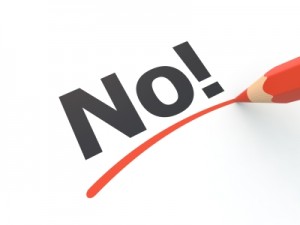 I have periodically noticed there seem to be a lot of issues around the word “no.” Not so much about saying it, but about not saying it. It is the absence of no, at times when it is the best answer, which seems to create all sorts of problems.
The dictionary says simply that ‘no’ means “a negative response; a denial or refusal.” In and of itself that meaning certainly doesn’t seem to be a big deal. So what’s the issue?
During an exploration of his “stressed out” state, one of our clients recently blurted out, “If I say no, the whole house of cards will come down! People will find out that I’m inadequate…I have to say yes to everything that comes at me to please everyone, even though the demands are killing me!” This client is not the exception and he is likely correct, this need to perpetuate a “superman” image is probably killing him and it could be killing you and/or your team members. As a leader it’s important to consider this. Do you have a culture that does not allow “no?” What are the consequences?
I have periodically noticed there seem to be a lot of issues around the word “no.” Not so much about saying it, but about not saying it. It is the absence of no, at times when it is the best answer, which seems to create all sorts of problems.
The dictionary says simply that ‘no’ means “a negative response; a denial or refusal.” In and of itself that meaning certainly doesn’t seem to be a big deal. So what’s the issue?
During an exploration of his “stressed out” state, one of our clients recently blurted out, “If I say no, the whole house of cards will come down! People will find out that I’m inadequate…I have to say yes to everything that comes at me to please everyone, even though the demands are killing me!” This client is not the exception and he is likely correct, this need to perpetuate a “superman” image is probably killing him and it could be killing you and/or your team members. As a leader it’s important to consider this. Do you have a culture that does not allow “no?” What are the consequences?
One of the consequences around this “no/yes” issue is that many don’t necessarily say yes as much as they imply yes because they don’t feel safe giving a straight out decline and they are afraid they can’t deliver to a ‘committed yes.’ These people often feel burdened and in a state of sacrifice and when the eventual ‘expose’ happens, they point out they never really agreed to or said yes to XY or Z. This leaves the person failing to say yes a victim, feeling very overloaded, and probably greatly stressed and the person or project they implied the ‘yes’ to swinging in the breeze.
So what do we do? On a personal level, I managed to essentially cure myself of this disease through an agreement I made with Joanna, a wonderful staff person at an organization I have been active in for more than 30 years, The Hunger Project. As many of you have experienced, if you say yes to volunteering or funding, you will most certainly be asked again. If you perform, the requests will become more frequent. It’s the old saying “if you want something done, ask a busy person.” At a certain point, I noticed myself avoiding Joanna’s calls and that did not work for me.
 So I cut a deal with Joanna in which I promised to take her calls, no matter what, and she never had to feel guilty about making another request, even if the last one was just yesterday. In return I would genuinely consider the request and unless I was really interested, most of the time I would simply say no. No stories, excuses, apologies, etc. Just no.
So I cut a deal with Joanna in which I promised to take her calls, no matter what, and she never had to feel guilty about making another request, even if the last one was just yesterday. In return I would genuinely consider the request and unless I was really interested, most of the time I would simply say no. No stories, excuses, apologies, etc. Just no.
It took a while for me to get over feeling uncomfortable. The little voice in my head would start with things like “she really needs help and you certainly could give it,” “if you were really committed you would have said yes,” “the really good volunteers would have said yes,” yada-yada-yada...
It didn’t take long before I noticed how much energy I had when I did say yes and how much more fun those projects were. Joanna was happier because she could always connect with me – no chasing – and have a conversation about the project she was working on. Many times that produced a creative brainstorm.
If you find yourself identifying with this “no” problem, find someone you trust and make the deal. Be sure that when you practice saying ‘no’ you remember you are declining a request, not the person making it. This is a key distinction and will shift your discomfort. The practice is not to say ‘no’ to people on a personal level, but simply to whatever they are asking you to participate in.
Also, make careful note of what pops into your head when you get a request. If you learn to self observe, you will discover keys to transforming your life. Those little negative conversations that were embedded in your mental ‘File Cabinet’ at an early age have been shaping your life and have had an iron grip on you. Expose them and you get to make a free choice, as an adult, about whether you are going to listen to the noise or prime your brain with more productive conversations.
